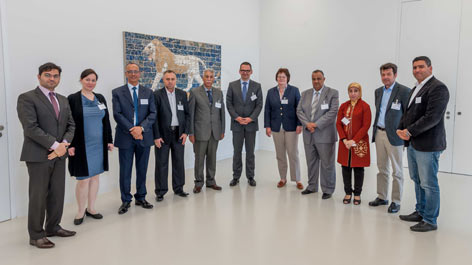Bereichsnavigation
Sustainable Protection of Cultural Heritage in the Countries of Origin
The Foundation works to sustainably protect cultural assets in countries of origin as well. It runs various projects for capacity building: providing training for local experts so they are better able to undertake it themselves.
Sustainable Protection of Cultural Heritage Through Capacity Building
Helping people to help themselves is often referred to as "capacity building". It involves training the people who are responsible for the protection of cultural heritage. The idea is to empower them to perform this duty without any further help from outside.
Capacity building is the core strategy in the sustainable development of cultural and natural heritage sites. Training programs of this kind play a crucial role in the implementation of the UNESCO World Heritage program. Cultural heritage can only be safeguarded in the long term if the right scientific, organizational and infrastructural conditions exist at national and international level.
Contribution by the Stiftung Preussischer Kulturbesitz
The Foundation is actively involved in various cooperative projects for capacity building. Acknowledged experts offer education and training programs all around the world. They conduct bilateral discussions and collaborate on international projects. The Foundation thus contributes to the international protection of cultural heritage, especially in the countries of origin of the cultural objects in its collections.
Example: Syria and Iraq
The Director of the Vorderasiatisches Museum (Museum of the Ancient Near East), Prof. Dr. Markus Hilgert, together with Iraq’s ambassador to UNESCO, Prof. Dr. Mahmud al-Mullakhalaf, has initiated the expert dialogue on "Iraq's Cultural Heritage at Archaeological Sites and Museums ". This Iraqi-German contact group has launched a capacity building and cooperation program. This is intended to further the conservation, scientific documentation, and public presentation of archaeological property in Iraqi museums. Syrian scientists and restorers come to the Vorderasiatisches Museum in Berlin in order to exchange opinions and experience with their German colleagues. This knowledge is needed for the preservation and documentation of archaeological objects from ancient Mesopotamia.
Since 2013, the Museum für Islamische Kunst (Museum of Islamic Art) and the Deutsches Archäologisches Institut (German Archaeological Institute) have been collaborating on the creation of a Syrian heritage database. The German and Syrian team members of the Syrian Heritage Archive Project are digitizing and cataloging archival material. The database is not merely a record of wartime destruction in Syria. It also provides a basis for reconstruction. At an early stage, scientists contacted various interest groups and the government department of antiquities in Syria. Local experts provide important details of the devastation. In addition, a watch is kept for illegal excavation and trafficking. The Syrian Heritage Archive Project at the Museum für Islamische Kunst is funded by Germany's Federal Foreign Office.


